Southern Gas Corridor
Location:
Azerbaijan, Georgia, Turkey, Greece, Bulgaria, Albania, Montenegro, Croatia, Italy
Project Risks:
Environmental Destruction, Social Harm
Shah Deniz:
- BP plc
- State Oil Company of the Azerbaijan Republic (SOCAR)
- National Iranian Oil Company (NIOC)
- Türkiye Petrolleri AO (TPAO)
- PJSC LUKOIL
- MVM Energetika Zrt
South Caucasus Pipeline:
- BP plc
- State Oil Company of the Azerbaijan Republic (SOCAR)
- National Iranian Oil Company (NIOC)
- Türkiye Petrolleri AO (TPAO)
- PJSC LUKOIL
Trans Anatolian Pipeline:
- BP plc
- State Oil Company of the Azerbaijan Republic (SOCAR)
- BOTAS Boru Hatlari Ile Petrol Tasima AS
Trans Adriatic Pipeline:
- BP plc
- State Oil Company of the Azerbaijan Republic (SOCAR)
- Snam SpA
- Fluxys NV
- Enagas SA
Gas Interconnector Greece – Bulgaria:
- DEPA International Projects SA
- Edison SpA
- IGI Poseidon SA
- Bulgarian Energy Holding EAD
Ionian Adriatic Pipeline:
- PLINACRO d.o.o.
- Montenegro Bonus D.O.O. Cetinje
- Albgaz Sh.a.
Interconnector TAP:
- Snam SpA
Approximate location of the Shah Deniz field off Azerbaijan, the source of the gas that flows through the Southern Gas Corridor.
The Southern Gas Corridor: A Swath of Destruction Across Europe
The Southern Gas Corridor (SGC) is a gigantic fossil gas pipeline. It stretches 3,500 km (2,175 mi) from the shores of the Caspian Sea through Azerbaijan and Georgia, across the mountains of Greece and Albania, beneath the Adriatic Sea, to the heel of Italy.[4] The main components of the SGC are the Shah Deniz gas field and several connected pipelines: the South Caucasus Pipeline (SCP), the Trans Anatolian Pipeline (TANAP), and the Trans Adriatic Pipeline (TAP).[5] More pipeline projects are underway to supply European countries with gas from Azerbaijan.
Note: Reputational risk projects on GOGEL are updated annually. This article was last updated November 8 2024.
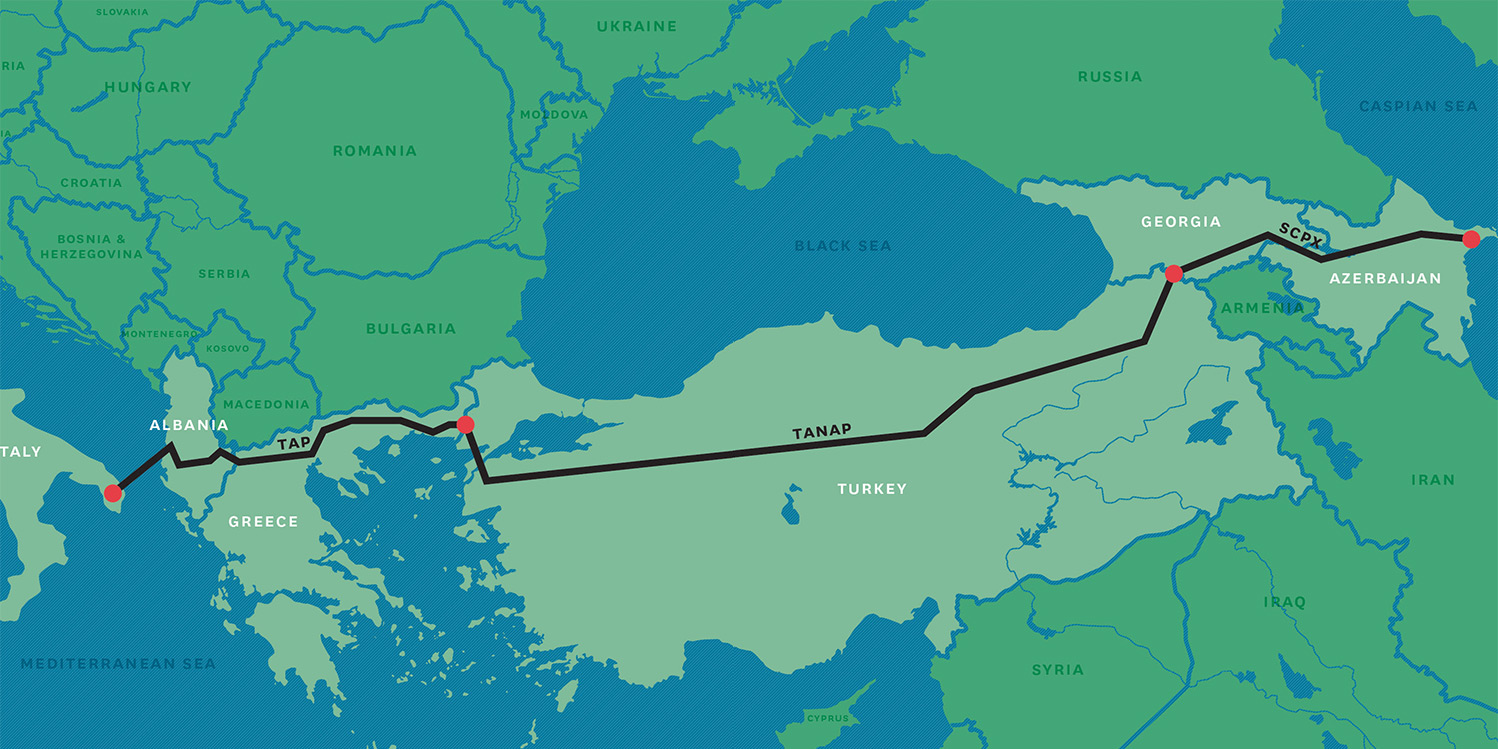
From start to finish, the mega pipeline leaves behind a trail of corruption, destruction, and harm. The SGC flushes big profits into the coffers of despotic dictators and gas companies that are blind to human rights abuses. It runs against the goals of the Paris Agreement.[6] All of this comes at the cost of destroyed lands and lost livelihoods for those who live along the pipeline's route.[7]
Azerbaijan: Rich in Gas, Void of Human Rights
The fossil gas that flows through the SGC begins its journey on the coast of Azerbaijan. It comes from the Shah Deniz gas field in the Caspian Sea.[8] From there, it makes its way through the South Caucasus Pipeline (SCP), the first critical piece of the SGC. The SCP runs 692 km (430 mi) through Azerbaijan and Georgia until it reaches the next pipeline section at the Turkish-Georgian border.[9] The oil and gas giant BP is leading the international consortium of companies that are involved in the Shah Deniz gas field and SCP. BP’s partners are Turkish TPAO, Azerbaijani SOCAR, Russian LUKOIL and Iranian NIOC.[10]
Azerbaijan is rich in oil and gas, but poor in human rights and democratic standards.19582 The Aliyev family has ruled the country since the 1990s. Current president Ilham Aliyev inherited the presidency from his father Heydar Aliyev in 2003.[12] Since Ilham Aliyev came into power, he has not held one single free and fair election.[13] It is an open secret that Aliyev’s party secures its majority through widespread double voting and lack of political choice.[14]
In Azerbaijan, the police is commonly accused of intimidating, arresting and torturing dissenters of the political regime.15415 Human rights organizations have reported numerous cases of political opponents, critical journalists, lawyers, and religious individuals facing bogus charges.1538515387 Human rights organizations estimate that as of June 2024, the Aliyev regime held 303 political prisoners.19581
Azerbaijan’s Gas Between Crime and Corruption
Amidst these allegations, Azerbaijan has spared no efforts to whitewash its international reputation. Over a two-year period between 2012 and 2014, Azerbaijan's political elite channelled USD 2.9 billion into the pockets of regime-friendly politicians and journalists in Azerbaijan and Europe via a complex money-laundering network.[20] A group of journalists traced the money that flushed through the so-called Azerbaijan laundromat back to the Aliyev family.[21] Human rights campaigners say that without this dirty money, the SGC may never have secured the necessary financial and political support from Europe.[22]
The companies behind Shah Deniz and the SCP are also entangled in corruption scandals in Azerbaijan and beyond. In 2022, leaked documents revealed that BP turned a blind eye to corruption allegations surrounding the Shah Deniz project. Although workers warned the British company about excessively high costs, missing wages and potential money laundering at Shah Deniz, BP continued with business as usual.14503 Azerbaijan’s state-owned oil and gas company SOCAR, the main operator of SCP, played a central role in a major international corruption scandal and criminal case.[23][24] SOCAR partly owns the company Electrogas which operates a gas-fired power plant on Malta.[25] In 2015, Electrogas and SOCAR signed a secret and lucrative deal guaranteeing SOCAR exclusive rights to supply overpriced gas to Malta.[26]
Maltese journalist Daphne Caruana Galizia did not want the dodgy Electrogas-SOCAR deal to go through at the expense of Maltese citizens.[27] Galizia investigated the deal and found an opaque network of companies and money that flowed between Azerbaijan, the Maltese government, and Dubai-based companies.[28] [29] Her investigations eventually cost her her life.[30] In 2017, before Daphne Caruana Galizia could release her findings, she was killed with a car bomb.[31] Business tycoon Yorgen Fenech is the alleged mastermind behind Galizia’s murder who now faces trial before Maltese courts.[32] Fenech used to be the director and co-owner of Electrogas as well as a business partner of SOCAR.[33]
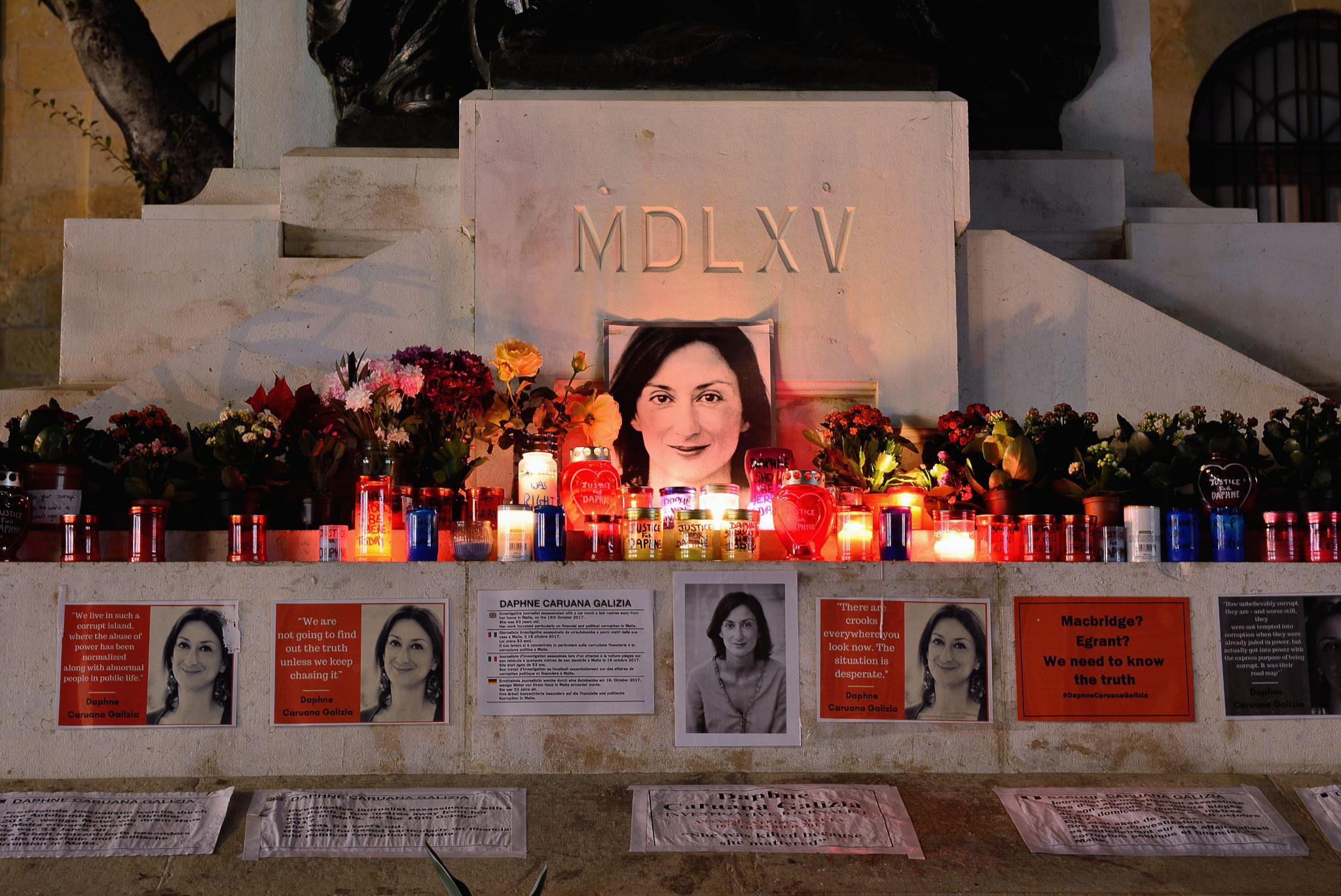
Profits over Human Rights
None of this is stopping oil and gas giant BP from teaming up with SOCAR and the government of Azerbaijan for Shah Deniz and SCP. For BP and the government of Azerbaijan, this is a win-win situation. BP remains loyal and silent to maintain its access to the Shah Deniz gas field, the largest gas discovery in company history.[35] In return, the Aliyev regime profits from the oil and gas industry that flushes revenues into the state’s coffers.[36]
BP’s loyalty to the Aliyev regime does not go unnoticed. Investigative journalist Khadija Ismayilova is one of those who observes the close ties between BP and the government of Azerbaijan. Azerbaijani police imprisoned her on arbitrary charges for 1.5 years in 2014.[37] Before her arrest, Khadija Ismayilova warned:
“BP bear a responsibility for what is happening in Azerbaijan. BP is one of the reasons why the west is very hesitant about any changes in this country. The Aliyev regime is good for BP. It allows their operations and they can sort out issues with the regime”.[38] Journalist Khadija Ismayilova, imprisoned in 2014.
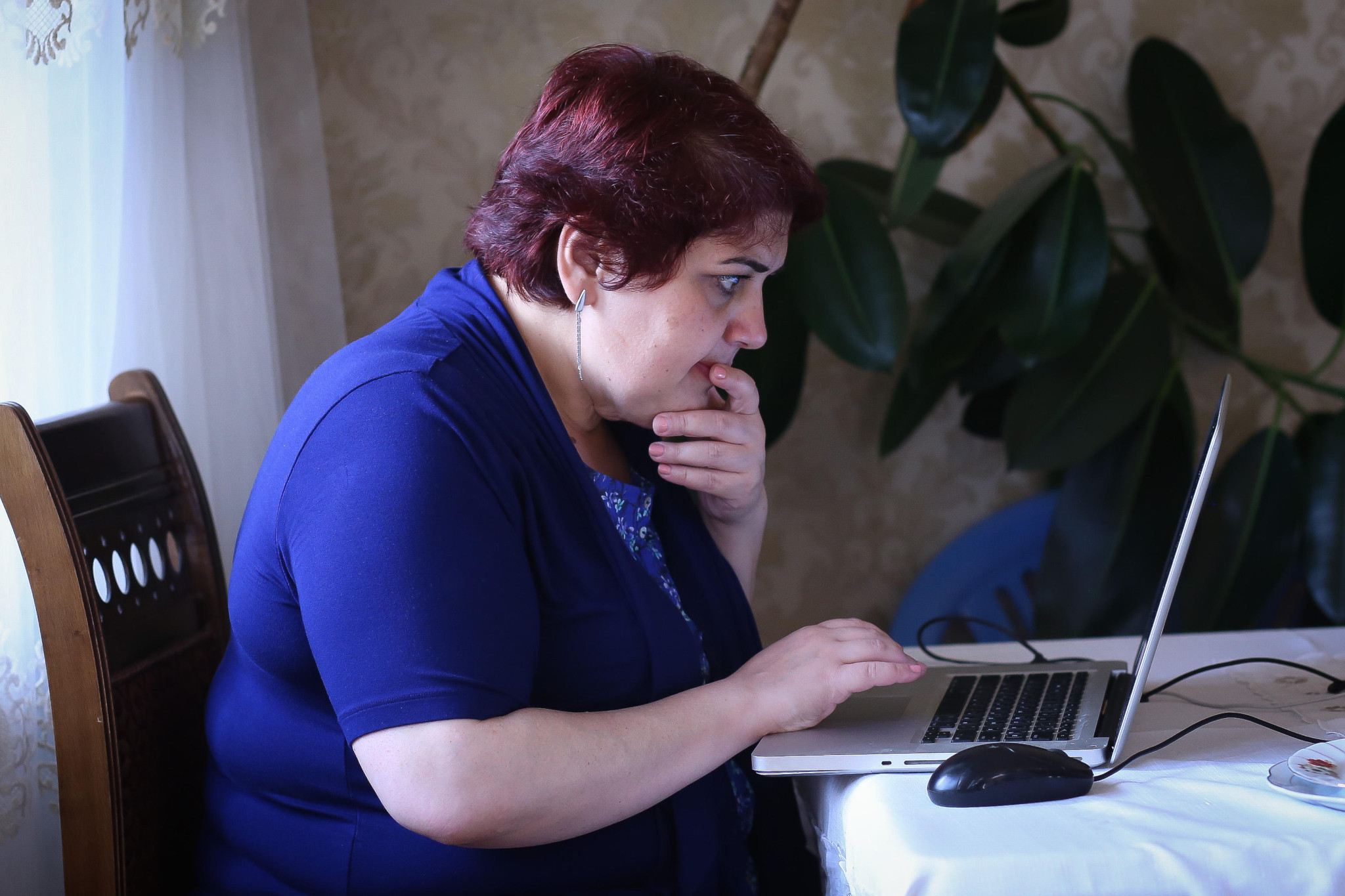
On its way to European markets, fossil gas from Azerbaijan passes another authoritarian state: Turkey.[39] At the Turkish-Georgian border, SCP connects with the second segment of the SGC, the Trans-Anatolian Pipeline (TANAP). TANAP runs 1,841 km (1,144 mi) through 20 Turkish provinces and nearly 600 villages.[40] [41] NGOs suspect that TANAP could have a severe impact on local people in Turkey.[42] Whether this has been the case can hardly be confirmed in a country with restricted freedom of speech and access to information.[43]
A Pipeline Steals and Destroys the Land
Wherever the Southern Gas Corridor passes through a democratic society, opposition has been fierce. The last 878 km (545 mi) section of the SGC, the Trans Adriatic Pipeline (TAP), runs through Greece, Albania and beneath the Adriatic Sea until it enters the southern Italian region of Salento. Along this route, the companies behind TAP took the lands of 45,000 people, destroyed vast olive groves and fueled intense protests.[44]
Around Kavala, an agricultural region in Greece, farmers and citizens did not want a pipeline that took their lands and jobs.[45] They protested on the streets and filed complaints and lawsuits.[46] Many of them felt sidelined by the gas companies who had not sufficiently consulted them about TAP.[47] Near the village of Zygos, one farmer was unaware that the TAP would cross his lands.[48] He only found out on the day that the companies showed up with bulldozers and diggers.[49] Another farmer in Thessaloniki called the police to stop the companies. However, after the farmer and the police left the scene, the companies continued their path of destruction across his fields.[50]
Olive Trees in the Way of a Pipeline
In the steep Albanian mountains, where once vast olive groves and fruit orchards used to grow, TAP has left barren stretches of land.[51] SOCAR, BP and their partners bulldozed the rural area where many farmers and their families live off the olive and fruit harvest.[52] The farmers reported that the companies handed out minimal compensation which barely covered the lost property and income.[53] According to an environmental organization, one farmer in Berat county in central Albania received only the equivalent of a year’s income for his destroyed olive trees.[54] The companies simply ignored that it takes 15 to 20 years until newly planted olive trees bear fruit again.[55] Representatives of TAP AG, the joint venture through which BP and its partners own the pipeline, allegedly threatened those who disagreed with forced expropriation.[56] [57]
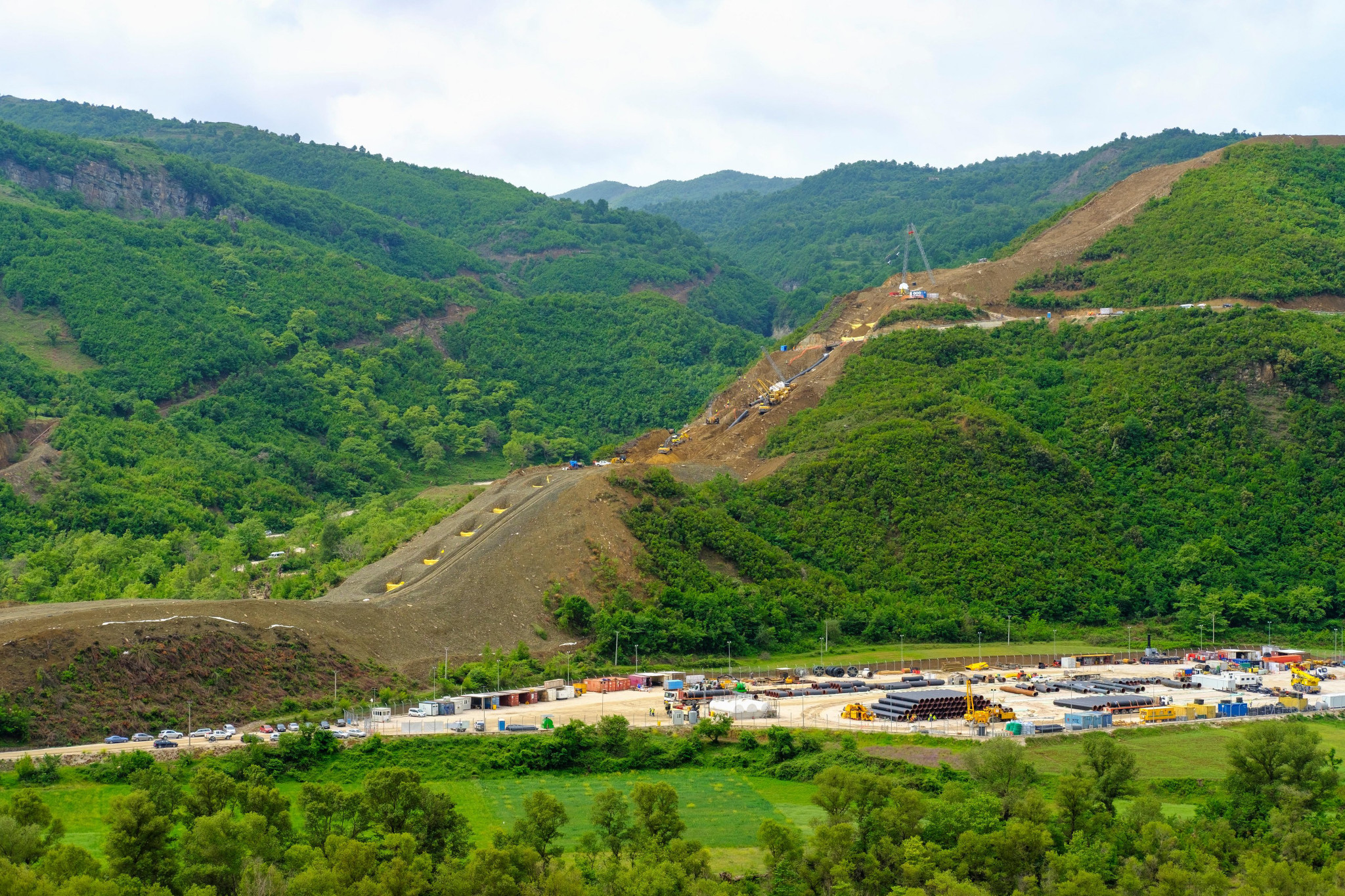
Opposition to TAP has by far been greatest in Italy. On the Salento peninsula, the last part of SGC carves through the lands that belong to hundreds of families. It carves through lands on which more than 10,000 olive trees once used to grow, some of them more than 400 years old.[58] [59] The companies have ripped out many thousands of these trees to make way for TAP.[60] Olive trees are of immense value to the local people. They used to be the backbone of their livelihoods and nurtured their feelings of home.[61] Now, many of the olive trees are gone.
To fight for their century-old trees, the people launched the NoTAP movement. In 2017, when the bulldozers arrived at the olive groves, local teenagers, elders, mayors, and activists stood in between the trees and the heavy machinery to protect the basis of their livelihoods. The police met their peaceful and colorful protest with violence.15391 In March 2021, Italian courts handed out sentences to the protestors that add up to decades of imprisonment.[62]
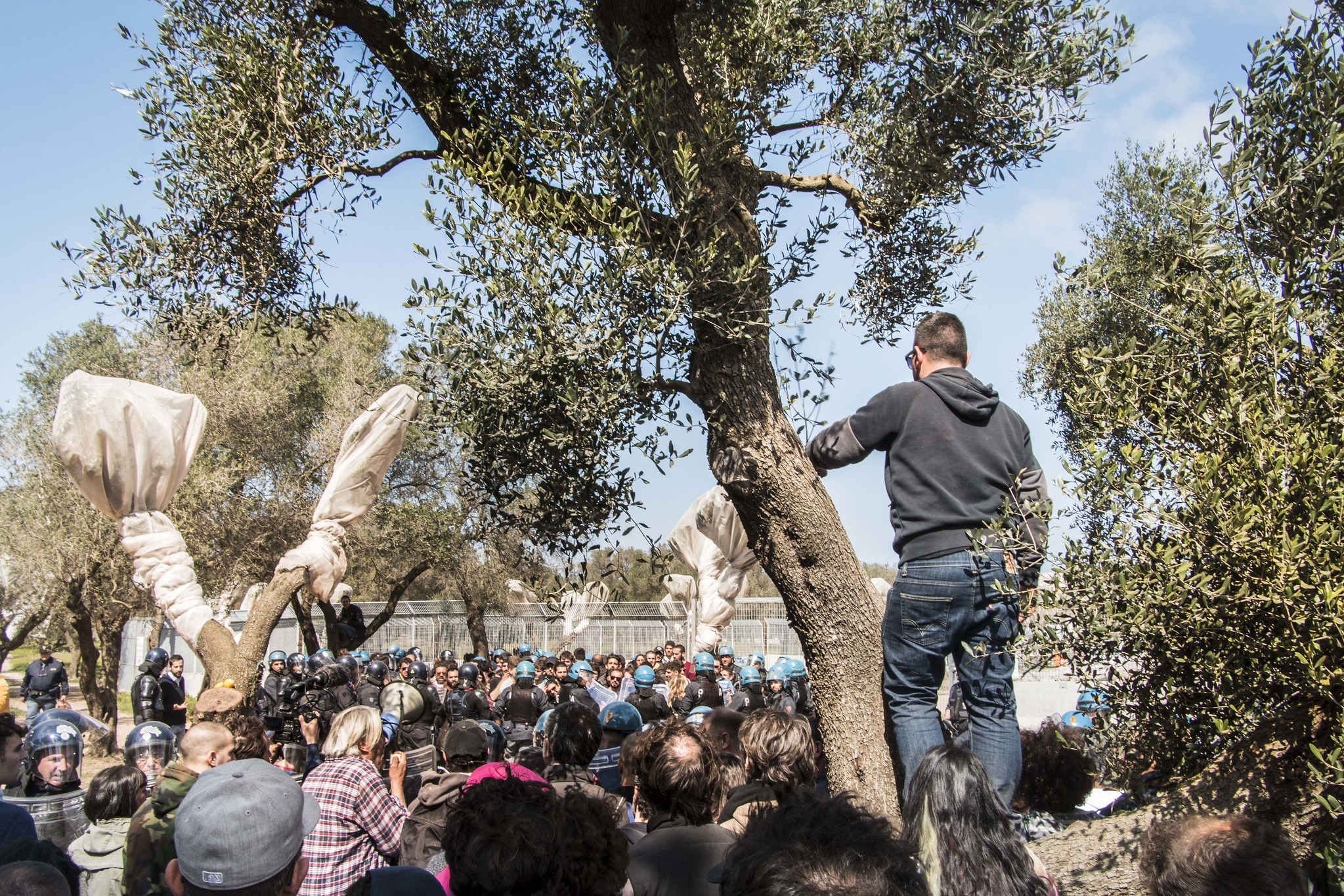
In contrast, Italian courts have taken their time to open a court case against the pipeline companies.[63] After several postponements, the courts are now hearing a case against TAP for the damage it caused.[64] [65] The prosecutor argues that the companies behind TAP removed olive trees and polluted groundwater with industrial wastewaters without a valid permit.[66] [67] The trial is ongoing but delayed due to numerous changes of judge in charge of the trial.19583 If confirmed, the court may revoke TAP’s environmental permit, without which the companies could have never built the Italian section of the pipeline.[68]
On Track to Further Expansion
The spiderweb of gas pipelines that delivers fossil gas from Azerbaijan to all over Europe is growing. Many companies are planning and building connecting pipelines that will branch off the Southern Gas Corridor and pump more gas across the continent. The Gas Interconnector Greece - Bulgaria (IGB) is one of these connecting pipelines.[69] Since October 2022, the IGB has pumped gas from the Southern Gas Corridor into the Bulgarian gas network.14505 From Bulgaria, another pipelinebringing the Azerbaijani gas into Serbia just commenced operations.[71] The Ionian Adriatic Pipeline (IAP) is a proposed pipeline to pump the gas 540 km (336 mi) from TAP through Albania, Montenegro and Croatia.15417 Bosnia and Herzegovina is also eyeing a connection to the proposed IAP.15393
For the gas companies, the growing network of connecting pipelines and the global energy crisis are a welcome opportunity to scale up the SGC. SOCAR, BOTAS and BP are planning to expand TANAP’s annual capacity to 31 billion cubic meters.[73] The companies behind TAP also want to double the amount of gas they pump into Europe from 10 to 20 billion cubic meters per year by 2027.15395 The EU welcomes these expansion plans. After Russia’s invasion in Ukraine, the EU signaled it wants to buy more fossil gas from Azerbaijan as a substitute for Russian gas.15397 The country’s massive expansion plans are at odds with hosting the 2024 UN-climate conference (COP29) in Baku. Despite massive criticism from climate activists, a former executive of SOCAR was nominated to guide the annual climate negotiations.19584 President Aliyev and official COP29 executives are allegedly using their roles to push for more investments in the country’s fossil fuel sector.1958519586
The EU’s turn towards Azerbaijani gas is a recurrent mistake.15399 Tensions with Armenia regarding the Nagorno-Karabakh enclave have routinely turned deadly over the past years, with some calling the conflict an intentional “ethnic cleansing” of Armenians.1540115403 When the EU imports more gas through the SGC, it will rely on fossil gas infrastructure that is partially owned by the Russian company LUKOIL. LUKOIL holds shares of almost 20% in Shah Deniz and the South Caucasus Pipeline.15405 It is a major taxpayer in Russia.15407 At the same time, Azerbaijan has deepened ties to Russia with a November 2022 deal to import gas from Russian state-owned company Gazprom. Campaigners describe Gazprom as the "long arm of the Kremlin".1540915411 The deal made clear that Azerbaijan imports Russian gas in order to export more Azerbaijani gas to Europe.19587
No Done Deal
Although the SGC began operations on its whole length during the last days of 2020, it is not a done deal. Whether the SGC will expand is a matter of money. Institutions that provide financial support to the companies behind SGC are writing a blank check for human rights abuses, destroyed lands and lost livelihoods in Azerbaijan and across Europe, while once more tying Europe to an autocratic regime.
Groups working on the Southern Gas Corridor: Platform London, Amnesty International, Bankwatch, 350.org, Oil Change International, Re:Common, CounterBalance, BankWatch, NO TAP, Defund TAP
Sources: